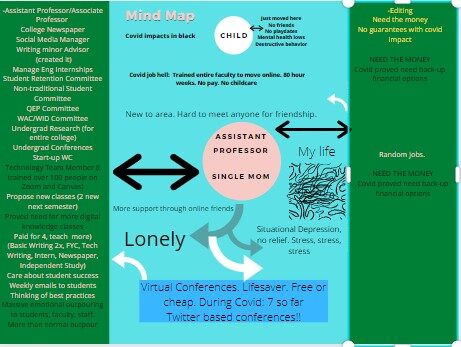"We are Not Ok: Single Parenting During Covid
Erin B. Jensen
Keywords: Single parenthood, online community, digital art
Categories: Parenting and Possibility in Impossible Times; Arting/Crafting/Making in a Crisis; Building Community in Isolating Times
“Reach out to the single parents that you know. Especially if they only have one child. Especially if one of them is an introvert and one of them is an extrovert. I can guarantee, they are not doing ok.” (Facebook post, Summer 2021)
I could have added so many things to my short message on Facebook. I could have added that there is a need to reach out to single parents who are teaching six classes on Zoom in the same room where their elementary-aged child is trying to concentrate on his online school work. I could have added to reach out to the single parent with a child on a 504/IEP plan who is supposed to still be successful in their work even though there are no accommodations being made to give them the best learning situation possible. I could have added to reach out to the single parent who cries herself to sleep at night and barely drags herself out of bed each morning, as her child fends for himself for meals and is known as the feral child of the neighborhood. I could have added to reach out to the single parent who takes her child to in-person meetings, and then has colleagues and administrators complain that the child is there, and when she replies that there is no childcare during a pandemic and asks what should she do with him, is told that she should have thought about that when she decided to become a single parent! I could have added to reach out to single parents, especially the extroverted ones, because they have lost access to the in-person communities and activities that help them find happiness. As stated in my post, “I can guarantee, they are not doing ok.”
Recently, I participated in an interview for a research project focused on the experiences of tenure-track faculty members who taught online at the same time their children were also involved in online schooling at home. I shared my thoughts and at one point felt on the verge of tears, as I remembered and talked about this impossibly hard situation of teaching and having my child trying to complete his online lessons as well. At the end of the interview, I asked the researcher what she had generally discovered, and she paused before answering. Without giving me an answer about her own research, she said, “Single parents were forgotten in the pandemic, weren’t they?”
I definitely felt forgotten. In a Facebook group for single parents in academia, someone posted a similar question about how many of us felt forgotten by our universities, colleagues, children’s schools, extended family, and friends. The resounding number of answers and replies indicated that many of us did feel forgotten. The question was then posed, “What could we do to help support each other?”
I was teaching a college digital art class at the time and had just had my students create digital art projects focused around topics in their lives. Many of my students had emailed me that they found it very therapeutic to digitally express their feelings about being a student during a pandemic. Because of my students’ responses, I decided to suggest to the Facebook group that maybe we could use digital art to express our feelings. Several people in the group seemed skeptical that digital art was going to help but were willing to try. We made a separate group for this idea, created our images, posted them in the group, and then spent time commenting on the images and creating connections among our shared experiences of feeling forgotten and lonely.
As I started thinking of how to best display what I was feeling about being a single parent in the pandemic and not “being ok,” I found that my emotions and thoughts still came out in words, instead of images, probably partly due to my being an English professor and partly because words are how I think about the world. My contribution to the group was Image 1. Many of the group members used more abstract shapes and images and fewer words to express their feelings. But, for me, this is how I felt about being a single parent during the pandemic and not “being ok.”

Description: Graphic titled “Mind Map” and divided into three columns of information. The left section in green lists all the job titles and duties Erin had during the pandemic, including “Assistant/Associate Professor,” “Social Media Manager,” “College Newspaper,” “Propose new classes,” “Weekly emails to student” and other related positions and tasks. The middle blue section focuses on her thoughts about her life and having a child, including “lonely,” “new to area,” “single mom,” “child no friends,” “no childcare,” and “Covid job hell.” The third column is in green with the words “need the money” repeated several times. Arrows are used to show the connection between the middle column and the other two columns.
As I was creating my image, I really started with the idea that I wanted someone to see me, to “reach out” to me, to see the overwhelming struggles I was feeling and experiencing. With that as the focus, I began writing down and organizing around lists of my responsibilities. These responsibilities were contributing to these feelings of not “doing ok” and being overwhelmed with my life. I found that visually creating a snapshot of my life was a therapeutic exercise that was very needed. Being able to visually see what I was thinking was important, as it gave me a way to start processing my reality.
By posting this image to the group and seeing other people’s images of their feelings, I began to feel less alone. While I still wanted people in my family and community to reach out to me (i.e., my request in my Facebook post), I began to interact more with the community of single parents as our images revealed many shared struggles and fears. There was an openness and shared connection as we viewed and commented on each other’s images. As we shared with each other, we began to create new support networks, and I continue to be in contact with many of the single parents that shared to the group. Sharing our digital art and our emotions through our art connected us in ways that I had not anticipated.
“Reach out to the single parents you know. . . I can guarantee, they are not doing ok” was the reality for many single parents during the pandemic. Having an opportunity to create a visual representation of the “not doing ok” part, sharing this image with others, and forming new connections with those with similar experiences helped with not feeling as alone and isolated as we had felt earlier. While I often felt lonely and “not ok” during the pandemic, I also found a community of those in similar situations and learned how important communicating ideas through an image could be, both for myself as well as for others.
Bio
Erin B. Jensen is an Associate Professor of English. She teaches digital art, technical writing, social media writing, and freshman composition. In addition, she runs the school newspaper, evaluates online classes, and is currently helping to create a Writing Center.
